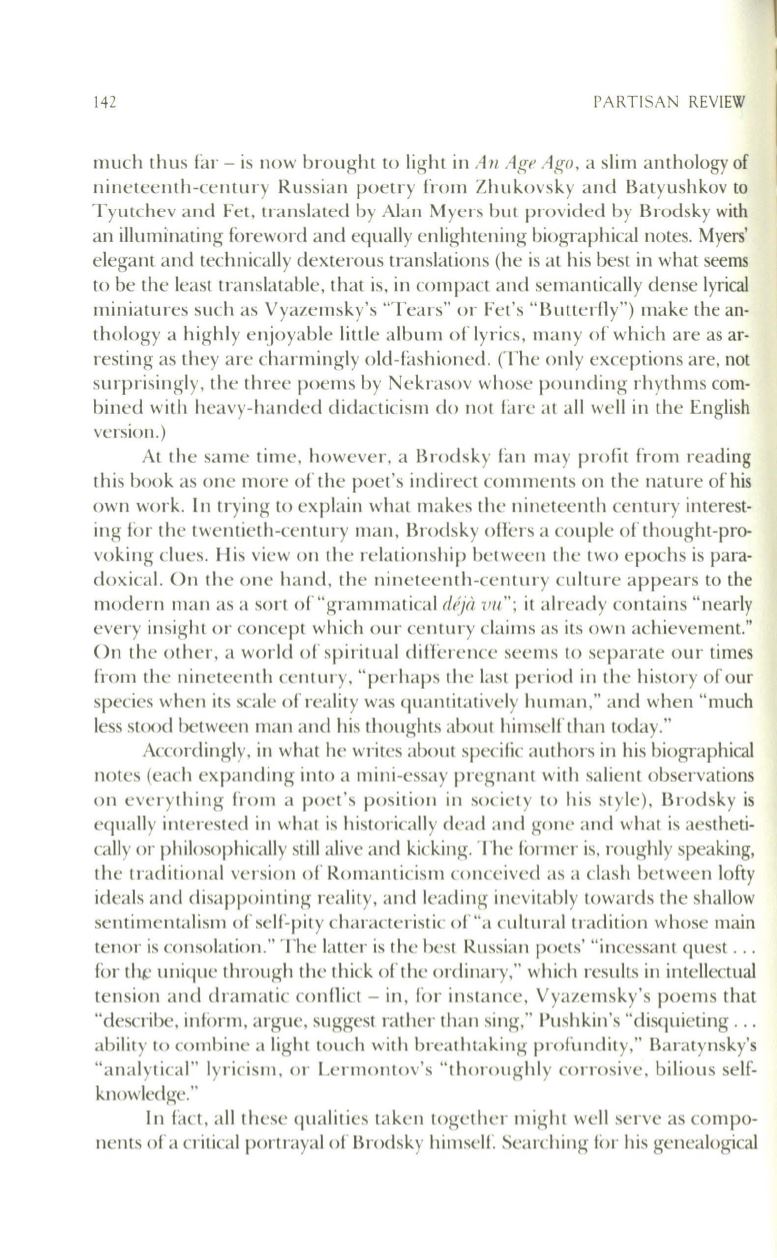
142
PARTISAN REVIEW
much thus far - is now brought to light in
All Agl' Ago,
a slim anthology of
nineteenth-century Russian poetry from Zhukovsky and Batyushkov to
Tyutchev and Fet, translated by Alan Myns but provided by Brodsky with
an illuminating foreword and equally enlightening biographical notes. Myers'
elegant and technically dexterous translations (he is at his best in what seems
to be the least translatable, that is, in compact and semantically dense lyrical
miniatures such as Vyazemsky's "Tears" or Fet's "Butterfly") make the an–
thologya highly enjoyable little album oflyrics, many of which are as ar–
resting as they are charmingly old-fashioned. (The only exceptions are, not
surprisingly, the three poems by Nekrasov whose pounding rhythms com–
bined with heavy-handed didacticism do not [Ire at all well in the English
version.)
At the same time, however , a Brodsky fan may profit from reading
this book as one more of the poet's indirect comments on the nature of his
own work.
In
trying
to
explain what makes the nineteenth century interest–
ing for the twentieth-century man, Brodsky ofiers a couple of thought-pro–
voking clues. His view on the relationship between the two epochs is para–
doxical. On the one hand, the nineteenth-century culture appears to the
modern man as a sort of "grammatical
dejrlllu";
it already contains "nearly
every insight
01-
concept which OUl- centUl-y claims as its own achievement."
On the other, a world of spiritual difference seems to separate our times
from the nineteenth century, "perhaps the last period in the history of our
species when its scale of reality was quantitatively human," and when "much
less stood between man and his thoughts about himself than today."
Accordingly, in what he writes about specific authors in his biographical
notes (each expanding into a mini-essay pregnant with salient observations
on everything from a poet's position in society to his style), Brodsky is
equally interested in what is historically dead and gone and what is aestheti–
cally or philosophically still alive and kicking. The former is, roughly speaking,
the traditional version of Romanticism conceived as a clash between lofty
ideals and disappointing reality, and leading inevitably towards the shallow
sentimentalism of self-pity characteristic of "a cultural tradition whose main
tenor is consolation." The latter is the best Russian poets' "incessant quest ...
for tilt: unique through the thick of the ordinary," which results in intellectual
tension and dramatic conflict - in, for instance, Vyazemsky's poems that
"describe, inform, argue, suggest rather than sing," Pushkin's "disquieting ...
ability to combine a light touch with breathtaking profundity," Baratynsky's
"analytical" lyricism, or Lermontov's "thoroughly corrosive, bilious self–
knowledge."
I
n fact, all these qualities taken together might well serve as compo–
nents of a critical portrayal of Brodsky himself Searching for his genealogical


